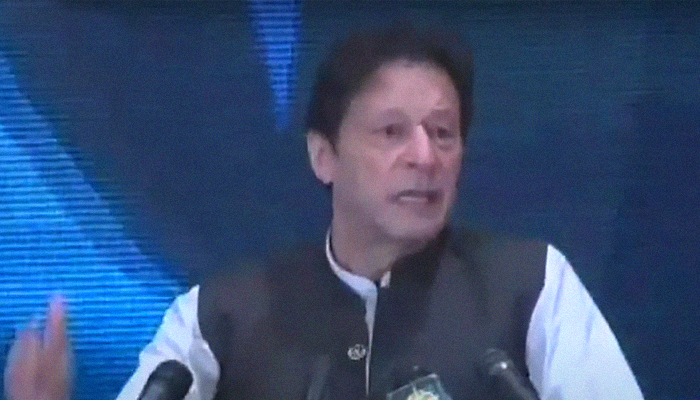PM Imran says 'national consensus' needed on Pakistan's gas situation, subsidies
September 09, 2020

ISLAMABAD: Prime Minister Imran Khan said Wednesday a "national consensus" was urgently required on the ongoing situation of natural gas in Pakistan, as well as the subsidies that were fuelling a circular debt crisis.
Speaking at a seminar on 'Sustainability, Security and Affordability of Natural Gas Supply in Pakistan' organised by Petroleum Division, PM Imran stressed on how if the country had debated on which fuel to use to produce electricity, "we would have not faced such a crisis".
"Only 27% Pakistanis use gas supplied via pipeline and the rest use LPG [liquefied petroleum gas] cylinders, which I use as well. The cost of LPG is 4% higher than the gas supplied through pipeline.”
"This is utter distortion," he said. "Subsidies are given to people who lack basic necessities or to remote areas that do not have adequate facilitation.
"That is how wealth is created — ultimately contributing to per capita income and GDP and, in our case, we can return the debts that we have since ages," he added, noting that a review of relevant documents made him realise how, in Pakistan, "subsidies are given to people who do not even deserve them".
'Still not sure' about more gas reserves
Expressing gratitude to the independent power producers (IPPs) for meeting the government to negotiate on contracts, the prime minister said it was very important to debate where Pakistan was heading.
"To date, we were relying on indigenous gas, the reserves of which are depleted now. We really need to think about it, especially when winter is around the corner and there is usually a shortage of gas supply," he said.
"First of all, we need to debate while keeping a hawk’s eye on the development of the country. It is also not possible that a province progresses and the country’s economy fails.
"We are assuming that there are gas reserves and we can extract gas but we are still not sure about it," he said.
"This debate is important for us because of the gas situation" in Pakistan since winters bring shortages every year, he explained, warning that the challenge would likely become a "bigger problem in next winters".
"We're relying on imported gas" — which is costlier — "and that compounds the circular debt in the gas sector", PM Imran added.
With imported gas costing Rs17 a unit, selling it for Rs14 a unit creates a gap worth Rs3 a unit, which leads to the worsening situation Pakistan is in, he said.
"We are hoping for a consensus," he said. "Khyber Pakhtunkhwa has spoken of its interests and Sindh too has shared its opinion on the matter but, eventually, the national interest needs to be promoted too," he added.
"We know that it’s quite an expensive process but I am expecting that we can build a national consensus while bringing all the provinces on board."
'Amazing' meritocracy of China's Communist Party
Separately, speaking of the Chinese leadership, PM Imran said the Communist Party has an "elaborate consensus building" as well as an "amazing meritocracy system".
"The Communist Party brings [their people] up to the top on merit. Theirs is a system through which their leaders — Premier Li [Keqiang] and President Xi [Jinping] — came to the top after a struggle; they deliberate and bring people up with merit," the prime minister said.
He further praised the exemplary long-term planning of China, wherein the country sets up strategy at least 20 years in the future. "It is crucial for a nation to plan in the long term," he said, adding that if Pakistan had done the same, it would not have been where it is today.
China, through a thorough debate, formed a 30-year policy, experienced phenomenal growth, and decided priorities on a national level, he said, adding that they focused and brought up the poorer areas.











